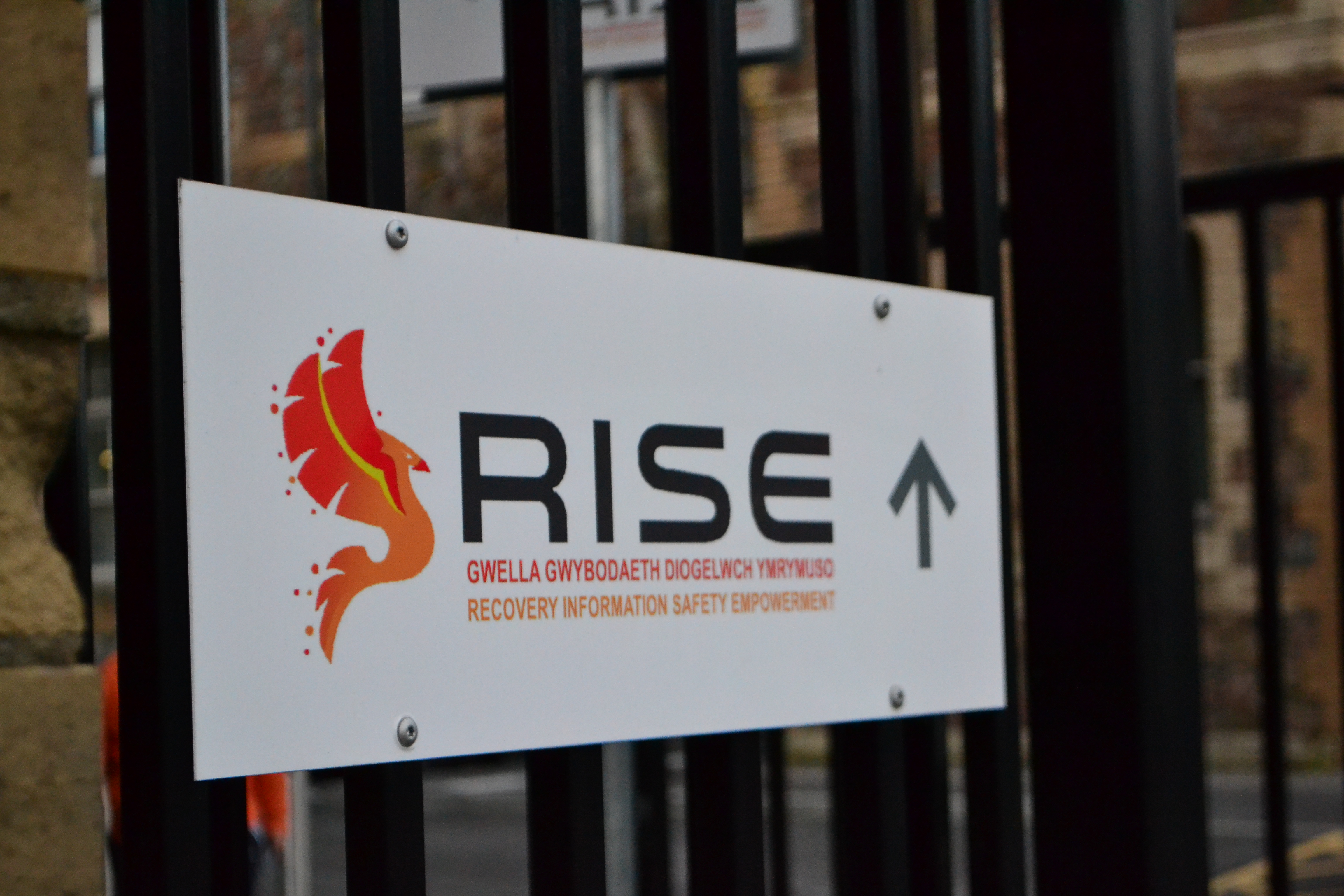
Essential Yet Underpaid: Cardiff’s Domestic Violence Workers Speak Out
Women’s refuges and helplines are essential for survivors of domestic and sexual abuse, yet behind the services, essential staff members are being underpaid and overworked. voice.wales spoke to several workers from RISE, a domestic abuse helpline commissioned by Cardiff Council. They told us about being paid just £20 for an all night on-call shift, low salaries, and the emotional strains of the job.
Image: RISE in Cardiff, photo copyright voice.wales.
I don’t do this job for the wage. This is something Diana, not her real name, made clear to me as we sat in a cafe on Cardiff’s Wellfield Road late last year.
She works as an IPA (Independent Personal Advocate) – providing emotional support and financial advice for women who are fleeing domestic and sexual violence.
“I love working with people… I do love that side of my job, I do like supporting – otherwise I would have ended it a long time ago,” Diana tells me. “[but] It’s the politics that go with it.”
By politics, she’s referring to stagnant wages, the emotional strains of the job, and the vastly underpaid on-call shifts the team are required to do – where they’re paid just £20 a shift.
Diana and her colleagues are required to work these on-call shifts several times a month, on top of their regular working day, answering emergency phone calls from women trapped in abusive relationships and exploitative situations through a service called Rise: ‘Recovery, Information, Safety, Empowerment.’
RISE provides a 24/7 service which aims to support, advocate and provide places of safety for women (and their children) who are experiencing or at risk of domestic and sexual violence and abuse, harmful practices, sexual exploitation, and stalking and harassment.
The service is commissioned by Cardiff Council, with Cardiff Women’s Aid the lead provider and Bawso and Llamau delivery partners.
Each on-call night shift – which starts at 7:00pm and finishes the next morning at 9:00am, pays just £20 for the whole shift, regardless of how busy they are. Alongside these on-call night shifts, there’s also a late shift, which runs between 11:00am and 7:00pm.
One worker we speak to, who we’re calling Andrea, says that due to understaffing issues, workers can often be asked to cover part of the late shift before going onto their on-call shift, meaning one runs straight into the other. There are no unsocial hours paid for this – just the regular £20 for the on-call shift.
On RISE’s website, they proudly display that there were 15,000+ phone calls to their helpline last year, and 9,000+ referrals. While there’s no question around how vital this service is, it comes at a huge cost and strain to the staff members who keep it going.
“So you’re working and then as soon as you finish working, you’re starting your on-call shift,” Diana says.
She tells me how she’s often too scared to go to the toilet without taking her phone with her when she’s on-call, just in case she misses a call, as she knows how vital it is that someone is there to pick up the call when a survivor of domestic or sexual violence gets that one chance to reach out.
Until fairly recently, workers would be required to work a whole week of on-call shifts – on top of their regular working week – at the same rate of £20 per shift.
“And literally, you would be knackered, you know, because [the helpline] was getting so many calls. At that time, we didn’t have Live Fear Free [another helpline] in the middle. So we were just taking everything…” Diana remembers.
Andrea tells me that when she started the job, she had no idea she would be required to work the Rise shifts as well as the day role she originally applied for.
When staff complained about the week-long on-call shifts, managers pointed out that the shifts worked on a rota-basis, and that staff weren’t always on-call, but in Diana’s eyes, this was besides the point, because somebody was always working the on-call shift. She says managers made out that staff were being ‘fussy.’
“No, we’re not being fussy,” Diana protested. “We’re making sure – you know, when we’re told that we’ve got to make the women that we support independent, strong and be able to talk – that’s what we’re doing. That’s what they don’t like.”
With the help of their union, the RISE staff eventually came together to challenge the week-long on-call shifts.
“We were like, nah that’s not right is it,” Diana remembers. “At the end of the day, we’re not going to be walked over… And if I have to bring in the union, then I have to bring in the union, because you’re not listening.”
The shifts are now over two days instead of seven, but the pay remains the same – £20 per shift, and staff are still required to go from their usual working day straight into the on-call shift.
Diana says the situation, whilst marginally better, is still unacceptable, mainly due to the salary being so low in the first place.
The workers I speak to say the new arrangement was never accepted by the union, but because they don’t yet have recognition, management simply imposed it. The plan now is to push for union recognition and get more organised.
“You’re not even giving us a decent wage in the beginning to justify any of it,” Diana argues.
But the cost of living has risen significantly in the last few years – surging by 5.1% in the 12 months to November 2021, up from 4.2% the month before. This is the highest it’s been since September 2011.
“I don’t really feel that I have a stable future,” Andrea tells me. “I would need to seek employment if I wanted to progress professionally. Or in other areas of my life, you know, cost of living and my salary make it very difficult for me to private-rent or to get a mortgage.”
While wages remain low, Diana points out that the pressures of the job have increased. They have more women to care for, and the added pressure of uploading notes promptly and preparing for regular audits.
“You know, just because I’m on about the wages, it doesn’t mean that I think any less of women or supporting, I just feel that we should be paid more, in an organisation that we don’t get any other perks for,” Diana adds.
Andrea says that workers in the sector are having to push for “basic employment rights”. “Health and safety are consistently inadequate,” she says. “The offices are unsafe. Some working practises are unsafe working – like lone working – and these are issues which staff have brought up… for years, and they’re never addressed by senior management or by HR.”
The issues experienced by workers in the sector have been compounded by a massive increase in calls during lockdown, with women finding themselves trapped at home with their perpetrators for longer periods due to workplaces and hospitality services being closed.
The domestic abuse charity Refuge recorded an average of 13,162 calls and messages to its National Domestic Abuse helpline every month between April 2020 and February 2021 – a 60% increase on the average number of monthly contacts at the start of 2020. One campaigner described this as an epidemic beneath a pandemic.
“It was kind of nonstop through the long lockdown… [we] really felt it,” Diana says.
There’s also the issue of the women who do reach out, but who can’t be helped due to services being unable to meet support needs.
In October last year, Welsh Women’s Aid published their fifth annual state of the sector report where they have “consistently called for the development of a sustainable funding model for the specialist VAWDASV [Violence against Women, Domestic Abuse and Sexual Violence] sector”.
According to the report, there was a 22% increase in the number of survivors who could not be supported by the refuge due to a lack of capacity or resources, when compared with the previous financial year.
The report also highlighted a significant increase in refusal from refuge over the previous financial year due to being unable to meet support needs around drug and alcohol (27%) and unable to meet support needs around mental health (61%).
It also magnified how “the VAWDASV sector had a devastating lack of flexibility allowed by the current funding model” during the pandemic, which “impacted services abilities to deliver support.”.
They also cite issues with staff recruitment and retention as a contributing factor and a problem the sector has “historically struggled with” but added that it “is now on the verge of becoming unmanageable.” The report states that this is due to short contracts and an inability to offer competitive pay and job security “compared to benchmarked roles in other sectors.”
“Because of the shortage of staff, people are employed without, you know, necessary skills, background or awareness of what the job really involves,” says Andrea.
She also points out that women who work at RISE may have their own traumatic experiences of domestic and sexual violence. Yet Andrea says that the support isn’t in place for them.
“There is a discrepancy in how we’re meant to conduct ourselves with clients, and then with the women who are in the service… There’s no difference and we have the same issues, the same problems, the same worries or even the same risks,” Andrea says. “I know that people have had experiences of abuse while working there, but felt unable to get support.”
Rise isn’t the only area where Andrea feels drastic improvements need to be made. She describes her workplace as not being a “safe space for women” due to a lack of support for those suffering trauma from abuse, mental health issues and struggling to juggle child care.
“It’s not a safe place to talk about mental health,” she adds. “There are people who’ve, like, you know, because of the type of work – [suffered] burn out, vicarious trauma… [but] there’s inadequate support for that.”
As Andrea puts it: “the support that we’re giving the client is just not there for us.”
We put the situation facing workers, particularly the on-call shifts, to Cardiff Council as the commissioner and body ultimately responsible for delivering the service.
Cardiff council Cabinet Member for Social Care, Health & Wellbeing, Cllr Susan Elsmore, said that RISE was “an essential service for vulnerable people in the city.” She said that whilst the service was commissioned by Cardiff Council, it was run by three separate organisations and that “the Council is not involved in setting the rates of pay for staff in these organisations.
Ms Elsmore said that whilst “the Council does require that commissioned services pay their staff a fair wage, under the terms of their contract with us,” they were not able to enforce partners to pay the real Living Wage.
Bawso directed us to Cardiff Women’s Aid as the lead provider in the project.
In a statement, Cardiff Women’s Aid confirmed that “the RISE service provides specialist needs-based, trauma- informed support to women and children of Cardiff through our 24/7 helpline, emergency accommodation, one to one support, specialist children’s service and aftercare and recovery group work and activities.”
They went on to say they face the challenge “of increasing demands for our services” but said they have been campaigning alongside the other providers “to increase the rate of pay which is dependent on levels of sustainable funding.”
“Cardiff Women’s Aid is a living wage employer and many of our roles include on call as part of their salaried role.”
None of the organisations we spoke to who are providing the service denied that workers were paid a flat rate of £20 per on call shift.
If you support this journalism, please support us from just £3 month


2 Comments
Comments are closed.